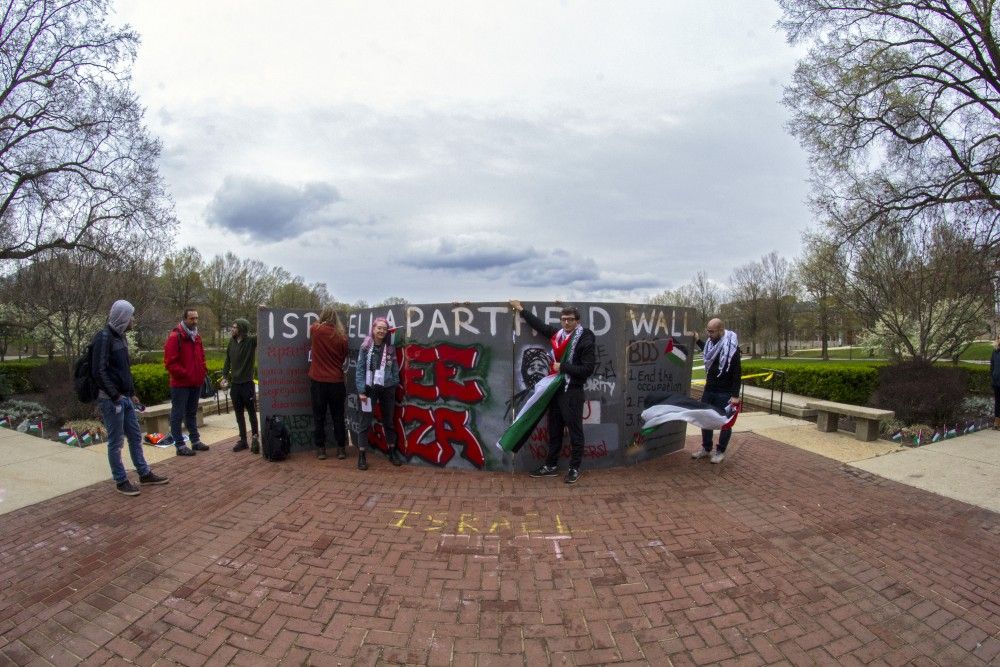Views expressed in guest columns are the author’s own.
A version of this guest column first appeared on the University of Maryland Students for Justice in Palestine’s Facebook page.
On Nov. 5, Terps for Israel, the Maryland Hillel, J Street UMD and others hosted a “dialogue” billed as an “Israeli-Palestinian Initiative for Understanding, Nonviolence, and Transformation.” We, Students for Justice in Palestine at the University of Maryland, object to this event. The organizations behind the event have built a record of hostility toward Palestinian students’ rights, and we believe this dialogue is meant to elevate a non-representative Palestinian voice to whitewash Israel’s dismal human rights record. SJP will hold a general body meeting on Monday for interested individuals to learn more.
Hillel International, the umbrella organization for Maryland Hillel, has a history of hostility toward Palestinian voices and their Jewish allies. In March 2017, B’nai Keshet, the Jewish LGBTQ student group at Ohio State, was kicked out of the campus Hillel for hosting a fundraiser for LGBTQ refugees alongside the campus Jewish Voice for Peace. In September 2016, UC Berkeley was forced to suspend a course, “Palestine: A Settler Colonial Analysis,” after Hillel leadership blasted it as “political indoctrination.”
More recently, in April of this year, the Jewish Student Union, Maryland Hillel and a number of pro-Israel organizations at this university hosted their annual celebration of Israel Fest despite the massacre of Palestinian participants in the “Great March of Return” in Gaza. Even though our organization — the primary advocate for Palestinian human rights on campus — has routinely voiced our objection to this event, neither J Street nor Terps for Israel were courageous enough to call for its cancellation. When on-campus groups refuse to seek true accountability for the shootings of Palestinian medics and press but organize a dialogue with their chosen Palestinian individual, it’s difficult to take the event at face value.
So why hold this dialogue now? Historically, institutions that support domineering power structures often elevate marginalized individuals whom they deem “acceptable” to frame the conversation on their terms. In 1967, President Lyndon Johnson ended his partnership with Martin Luther King, Jr. when Dr. King denounced US involvement in the Vietnam War. In 2016, Donald Trump made headlines when he called out “his African-American” at a rally. We see this “dialogue” as a recent example of powerful institutions elevating marginalized voices only when their proximity is convenient.
Monday’s event, “From Other to Brother: Let’s Talk Coexistence,” is framed as a venture to build dialogue between a Zionist settler and a Palestinian activist. While such a framing may look appealing, it creates the illusion that Israeli settlers and Palestinian activists approach their lives on an even playing field. Maintaining discourse around “building human understanding” may be comfortable, but the organizers don’t make it clear how Rabbi Schlesinger’s position as an Israeli settler represents the destruction of Palestinian nationhood from the outset. And so we see why Shadi Awwad is chosen to represent the Palestinian narrative: He is willing to play along in this game despite its larger and more sinister political implications.
Students for Justice in Palestine elevates truly grassroots Palestinian voices in our fight for Palestinian human rights. We carry out the call from the Palestinian BDS National Committee, a coalition of Palestinian labor unions and NGOs, to bring justice to the region. We bring a voice to the refugees by advocating for their right to return to their historic homeland. We bring a voice to prisoners by fighting for equal rights under the law. We bring a voice to all Palestinians by fighting for the end of the occupation. In this way, we elevate Palestinian voices without watering it down for more intransigent American audiences and give authenticity to our struggle for freedom for Palestine.
Students for Justice in Palestine is a group of university students, faculty, staff and community members that promotes justice for Palestinians. Contact the organization at umdsjp@gmail.com.



